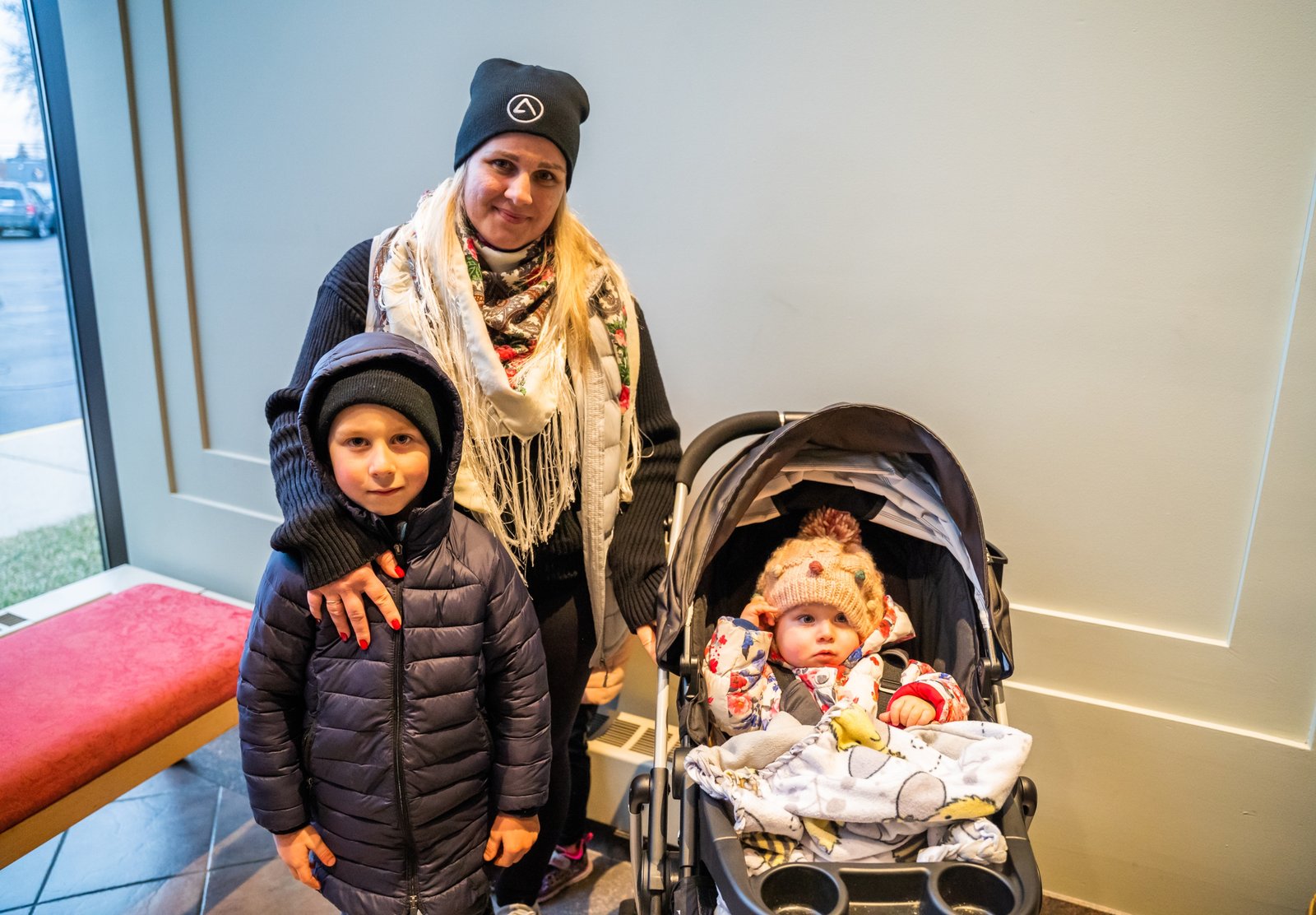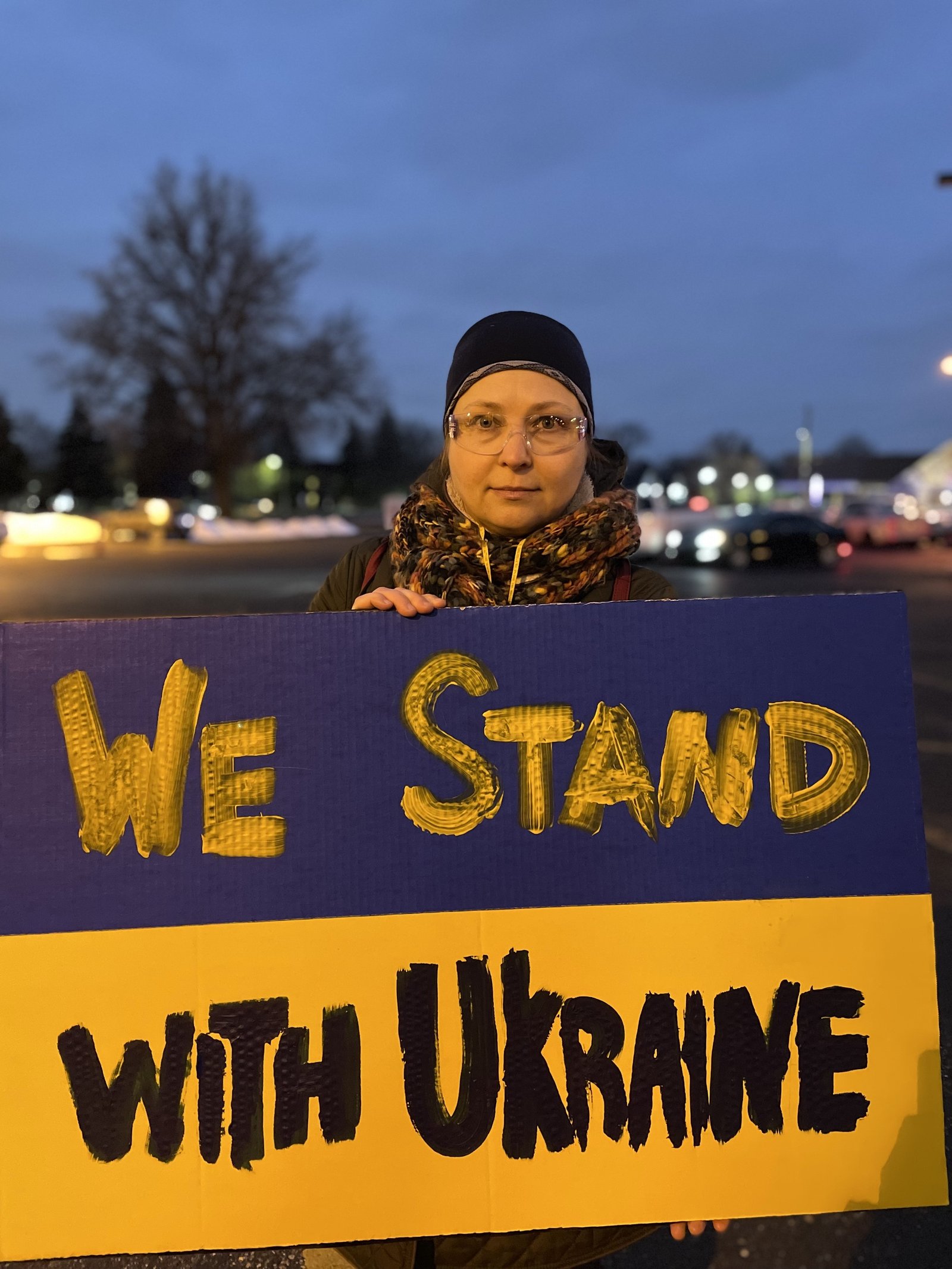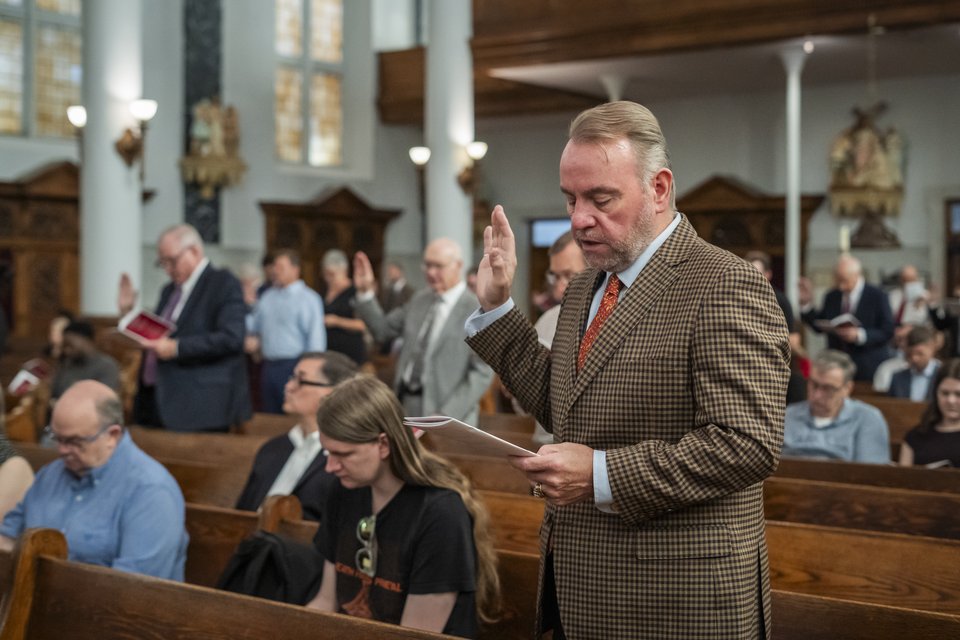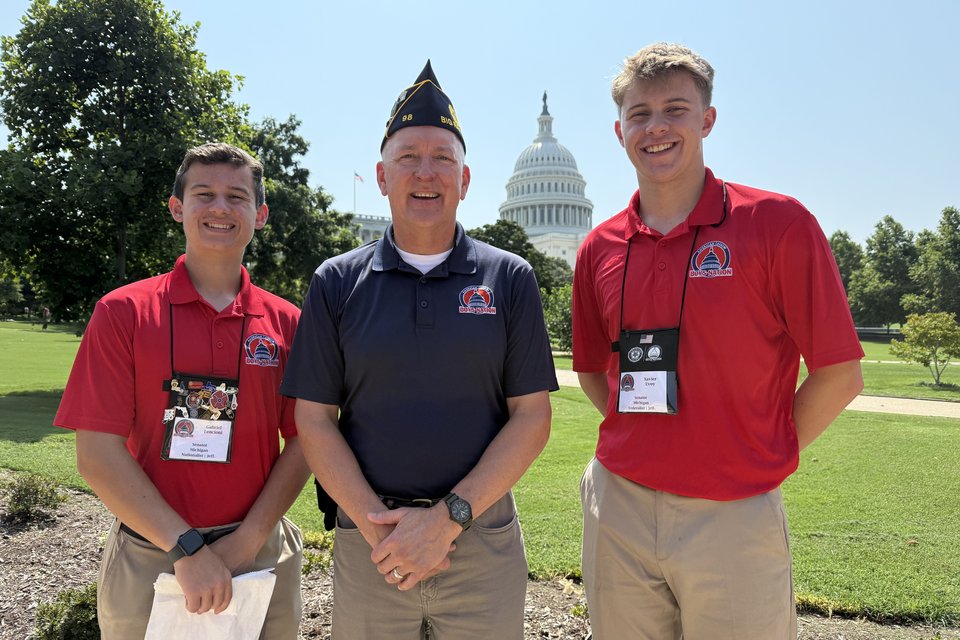Young and old Ukrainian-Americans in disbelief as they watch homeland devastated by Russian forces; Warren vigil implores aid for suffering
WARREN — As Ukrainians huddled in underground subway stations, fled their cities and tried to fall asleep on floors and in their basements early Friday while airstrike sirens blared around them and Russian troops marched closer to the capital city, Kyiv, loved ones in the United States and around the world watched in horror, praying and making desperate appeals to end the violence.
At St. Josephat Ukrainian Catholic Church in Warren, Ukrainian-Americans and community members gathered Thursday evening for an emergency rally, anxious about their family and friends and doing their part to spread awareness about the suffering taking place at home.
“All of our hearts are breaking. I have no words, I don’t know how to express myself; it is just sadness, sorrow, anger,” Ukrainian-American Vera Murha told Detroit Catholic. “My parents went through this many years ago (during World War II), and for us to be going through now is unimaginable.”
Like many others present at the rally, Murha has family still living in Ukraine, with whom she spoke earlier in the day. She said they are in Kyiv, awaiting evacuation.
“I want to say that we need to pray for them, but they need more than prayers right now; they need financial help. They need all of our support. They need to know that we are behind them,” Murha said.
Murha not only can’t imagine what her parents would think, but, she said, gesturing to the crowd, many young Ukrainian children are now being exposed to the unthinkable.
Bearing the Ukrainian colors of blue and yellow, holding signs of protest and calling for peace, local political and faith leaders led the vigil, standing outside in the freezing cold.
U.S. Rep. Andy Levin (D-Bloomfield Township) of Michigan’s ninth congressional district, who serves on the House Foreign Affairs Committee, Warren Mayor Jim Fouts and members of the Ukrainian-American community spoke from a podium, expressing their support for Ukraine, their disdain for the invasion and sharing stories of their own family heritage, often addressing the crowd in Ukrainian.

“(Russian President Vladimir Putin is) overrunning that country, which is a sovereign nation; it is a people with their language, their own culture, their own history,” Rep. Levin said. “This is the biggest land invasion since World War II. My message to our beautiful Ukrainian-American community here is that we are united, we stand with you all, and our allies will put a vice grip of sanctions on the Russian economy and will fight to do what it takes to restore the full territorial integrity of Ukraine.”
The last-minute event was organized by the Ukrainian-American Response Team in Detroit, a grassroots group of Ukrainian-Americans formed to respond to escalating crises in Ukraine in recent years. The group also helped organize relief efforts after the Russian annexation of Crimea in 2014.
Two weeks ago, the group organized an ecumenical prayer service at St. Mary the Protectress Ukrainian Orthodox Cathedral in Southfield with hopes that the conflict wouldn’t escalate.
In the early hours Thursday, following a speech from President Putin, Russia launched a full-scale attack on Ukraine, sending in troops from three fronts and attacking via missile strikes that targeted not only Ukraine’s military compounds and both military and commercial airfields, but Ukraine’s major cities, including Kyiv and Kharkiv.

In announcing the invasion, Putin issued a threat to Western nations, saying if they intervened, they would face “consequences greater than any you have faced in history."
On Thursday, Russian troops took control of the Chernobyl power plant, the site of a nuclear meltdown in 1986, leading to fears damage to the concrete compound surrounding the site could unleash radioactive particles into the atmosphere. Chernobyl is directly north of Kyiv, the Ukrainian seat of government, and as of early Friday, world leaders feared Russian troops would soon take the capital.
At the time of publication, at least 137 Ukrainians had been killed in the invasion, both civilian and military casualties, and another 316 people had been wounded, Ukrainian President Volodymyr Zelensky said.
In response, the United States and other nations have implemented sanctions on Russia and condemned Putin’s actions. In an address given Thursday afternoon, President Joe Biden declared Russia would face consequences for its actions. The Council of Europe, the continent’s main human rights watchdog, suspended Russia’s representation rights in the council Friday, and President Biden is expected to meet with NATO leaders Friday.
Pope Francis has called on Catholics and people of goodwill to pray and fast for peace in Ukraine on Ash Wednesday, and on Friday morning the pope paid a visit to the Russian embassy in Rome to personally express his concerns and call for peace.
Video and images from around Ukraine have shown traffic jams as citizens try to flee the country and reach safety, long lines at ATMs and gas pumps, wounded people, large missile shells and bombed-out buildings.
Michigan’s Ukrainian-American population, which numbers around 46,000, has reacted with a mixture of disbelief, fear and sorrow.
Romana Petryshyn attended the rally with her three young children. Petryshyn was born and raised in the western Ukrainian city of Ivano-Frankivsk. She told Detroit Catholic the local airport has been bombed, and that her grandparents and her husband’s entire extended family are still there, scared and with packed bags.
“My oldest one is almost 7, so he understands now. He asked questions about Putin and about what’s going on,” Petryshyn said. “We talk about Russian aggression and how it has been a thing for years, for centuries. So he knows where this is coming from. That’s the reason we came here today with the kids; we know they are young, but we are leading by example. We have to support our people back home and everyone here.”

Older Ukrainians told Detroit Catholic it is unfathomable to witness the same tragedy their parents suffered — and escaped from — decades ago.
Janet Tymczenko-Zuyus, who was born in Germany following World War II, said her father had suffered under both communism and the threat of Nazi Germany. As a 5-year-old, he watched his own father shot in the head by the Soviets for being part of the resistance. As a young man, he was made to leave his university in Kyiv to serve as a Soviet soldier and was eventually captured by the Germans. He survived and managed to escape, eventually ending up in a displaced person's camp, where he met Tymczenko-Zuyus’s mother.
Tymczenko-Zuyus said her father, who suffered from PTSD for his entire life, would be heartbroken.
“The only reason I am glad that my parents are not here is because of what is going on here right now,” Tymczenko-Zuyus said. “They would just die all over again, it would be too painful for them.”
Tymczenko-Zuyus said her own heart breaks — Ukrainians have been through hell before, she said.

“Ukrainians have suffered, and are still now, and all they want is to be free people and live in democracy,” she said.
Alongside the many Ukrainian-Americans were supporters from other eastern European countries. Polish-American Samantha Marecki said her own country has suffered, and she has great empathy as she watches Ukraine come under attack. Young people like herself have been instrumental in spreading awareness, particularly through social media platforms like Instagram and TikTok, she said.
“Using social media is a great way to allow other people to get educated and learn what is going on,” Marecki said. “(Also), call Congress, call anyone who is in a position of power that you think will help. Every word you say matters.”
Even several Russians were present at the rally, speechless at the destruction and evil coming from their home country.
“My paternal grandfather is from Ukraine, but I am a Russian citizen and I have lived for 20 years in the United States. I absolutely feel speechless about what is happening,” Olga Grushko tearfully told Detroit Catholic. “Ukraine has the full support of those Russians who are pro-democracy. There are a lot of people who sympathize who don’t want Putin in power, who want him out and think he is destroying Russia.”

Grushko said that while there have been protests among Russians, many Russians who speak out in their home country have been silenced or arrested.
“My heart goes to those (in Ukraine),” Grushko said. “I have been following Ukraine politics a little bit, and I felt so proud because they came from the same background of the Soviet Union, and they have been building their democracy. I just feel proud, and I know they have something to fight for. I believe that they have what it takes to fight for their freedom.”
Where to give to help Ukraine
- The international Caritas confederation is collecting funds to help Caritas Ukraine. In the United States, that is through Catholic Relief Services: https://bit.ly/3LWtOKa. Internationally, you can donate through https://www.caritas.org/.
- The Ukrainian Catholic Archeparchy of Philadelphia also has a link: https://ukrarcheparchy.us/donate.
- Two pontifical agencies also are taking donations for Ukraine: Catholic Near East Welfare Association, https://cnewa.org/campaigns/uk..., and Aid to the Church in Need, https://bit.ly/3sgpuNV. Internationally, Aid to the Church can be reached at https://bit.ly/3vfqCn4.
- The United States Conference of Catholic Bishops has a collection to help rebuild the Church in Central and Eastern Europe: https://www.usccb.org/committees/church-central-eastern-europe
- The Ukrainian-American Crisis Response Committee in Michigan recommends donations to the following: the Ukrainian Congress Committee of America (ucca.org) and United Ukrainian American Relief Committee(uuarc.org) and the Razom Emergency Fund.
Copy Permalink
Faithful citizenship












